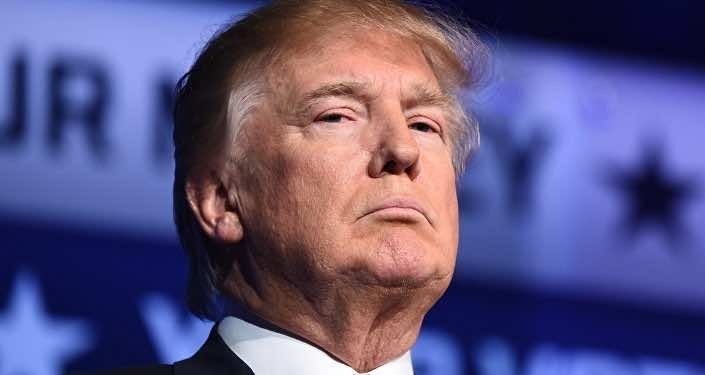Rabat - In a controversial move, US President Donald Trump announced on Saturday he wants to relocate Palestinians from Gaza, suggesting that neighboring Arab countries should increase their intake of Palestinian refugees.
Trump made the statement to reporters onboard Air Force One, outlining a strategy that would “effectively clean out” the war-torn enclave, where thousands of Palestinians are trying to recover from 15-months of Israel’s genocide.
He said he spoke with King Abdullah II of Jordan and planned to discuss the matter further with Egyptian President Abdel Fattah el-Sissi.
His proposal aims to fundamentally reshape Gaza’s demographic landscape by encouraging mass refugee resettlement across Arab nations. The resettling “could be temporary or long term,” he said he told King Abdullah II.
“It is literally a demolition site right now, almost everything is demolished and people are dying there,” the president continued to reporters. “So, I would rather get involved with some of the Arab nations and build housing in a different location, where they can maybe live in peace for a change.”
However, many analysts and Palestinian groups fear that this “temporary” proposition will most definitely turn into a long-term solution, as has been seen many times in history as such with the Nakba in 1948. Analysts warn that it is paramount to take Trump’s words seriously, accusing him of proposing Zionist ideology and ethnic cleansing.
Abdullah Al-Arian, professor at Georgetown University in Qatar, recently told Al Jazeera that similar propositions that have been brought forward in the past have failed for a number of reasons. He said relocating Palestinians to Egypt was “politically unviable in particular” because it was deemed “a possible destination for a mass ethnic cleansing of Palestinians from Gaza.”
Meanwhile and in a significant policy shift, Trump announced he has lifted restrictions on sending 2,000-pound bombs to Israel.
“We released them today,” Trump told reporters. “They’ve been waiting for them for a long time.” When questioned about the decision, he bluntly responded, “Because they bought them.”
The move counters a previous slight limitation designed to minimize civilian casualties during Israel’s genocide on Gaza, eliminating that humanitarian safeguard.
Despite some Americans’ hope that Trump would take a different approach than Biden during his term, the latest development is staunchly in line with Trump’s consistently pro-Israel political stance.
The proposed refugee redistribution plan represents a radical solution to the region’s long-standing territorial and humanitarian challenges.
The president’s remarks suggest a bold diplomatic and military strategy that could not only significantly transform the dynamics of the Israeli-Palestinian conflict, but also present a worsened reality for the Palestinians who are already suffering from the atrocities of Israeli genocide and ongoing occupation. The international community will likely criticize this proposal in the coming days.
Trump made the statement to reporters onboard Air Force One, outlining a strategy that would “effectively clean out” the war-torn enclave, where thousands of Palestinians are trying to recover from 15-months of Israel’s genocide.
He said he spoke with King Abdullah II of Jordan and planned to discuss the matter further with Egyptian President Abdel Fattah el-Sissi.
His proposal aims to fundamentally reshape Gaza’s demographic landscape by encouraging mass refugee resettlement across Arab nations. The resettling “could be temporary or long term,” he said he told King Abdullah II.
“It is literally a demolition site right now, almost everything is demolished and people are dying there,” the president continued to reporters. “So, I would rather get involved with some of the Arab nations and build housing in a different location, where they can maybe live in peace for a change.”
However, many analysts and Palestinian groups fear that this “temporary” proposition will most definitely turn into a long-term solution, as has been seen many times in history as such with the Nakba in 1948. Analysts warn that it is paramount to take Trump’s words seriously, accusing him of proposing Zionist ideology and ethnic cleansing.
Abdullah Al-Arian, professor at Georgetown University in Qatar, recently told Al Jazeera that similar propositions that have been brought forward in the past have failed for a number of reasons. He said relocating Palestinians to Egypt was “politically unviable in particular” because it was deemed “a possible destination for a mass ethnic cleansing of Palestinians from Gaza.”
Meanwhile and in a significant policy shift, Trump announced he has lifted restrictions on sending 2,000-pound bombs to Israel.
“We released them today,” Trump told reporters. “They’ve been waiting for them for a long time.” When questioned about the decision, he bluntly responded, “Because they bought them.”
The move counters a previous slight limitation designed to minimize civilian casualties during Israel’s genocide on Gaza, eliminating that humanitarian safeguard.
Despite some Americans’ hope that Trump would take a different approach than Biden during his term, the latest development is staunchly in line with Trump’s consistently pro-Israel political stance.
The proposed refugee redistribution plan represents a radical solution to the region’s long-standing territorial and humanitarian challenges.
The president’s remarks suggest a bold diplomatic and military strategy that could not only significantly transform the dynamics of the Israeli-Palestinian conflict, but also present a worsened reality for the Palestinians who are already suffering from the atrocities of Israeli genocide and ongoing occupation. The international community will likely criticize this proposal in the coming days.

